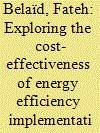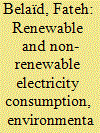|
|
|
Sort Order |
|
|
|
Items / Page
|
|
|
|
|
|
|
| Srl | Item |
| 1 |
ID:
176743


|
|
|
|
|
| Summary/Abstract |
This paper intends to examine the key drivers of household environmental attitudes and energy-saving behavior using both observed and stated attitudinal factors. Beginning with an assessment of energy-saving behaviors Item Response Theory (IRT), we associate hierarchical multivariate regression with an innovative variable selection approach via Elastic Net Selection (ENS). Our empirical study is based on data from the 2012 ENERGIHAB project survey. Empirical evidence in this article contributes with new insights about the main explanatory factors of household energy-saving behavior. The main results further suggest that energy-saving behavior tends to fluctuate throughout time in households. Our findings and approach generate broader methodological insights into energy efficiency analysis through behavioral aspects.
|
|
|
|
|
|
|
|
|
|
|
|
|
|
|
|
| 2 |
ID:
177394


|
|
|
|
|
| Summary/Abstract |
This research investigates the cost-effectiveness of energy performance measures in French residential buildings. We develop an empirical approach based on a multivariate statistical approach and Cost-Benefit analysis. The strength of this research relies on the designing of a large cross-sectional database collected in 2013 including rich technical information of about 1,400 dwellings representative of the French residential sector as well as individual recommendations relative to the energy renovations to be implemented, their investment costs, and energy savings potential. We provide valuable information on the cost-effectiveness of energy renovation measures for the entire housing stock. Results show that low-temperature and condensing boilers, as well as floor insulation, are the most cost-effective energy efficiency measures, which could be inconsistent with actual subsidy policies. We demonstrate that the cost-effectiveness of energy renovation measures is widely dependent on dwelling initial characteristics and the value of the inputs used in the economic indicators such as energy-savings amount, energy price, and the discount rate. Moreover, we provide a classification of French dwellings, which may help policymakers, better identify their target. Finally, we show that the renovation of the entire French residential dwelling stock can lead to a great amount of energy–and CO2–reductions but requires significant financial capacity.
|
|
|
|
|
|
|
|
|
|
|
|
|
|
|
|
| 3 |
ID:
162950


|
|
|
|
|
| Summary/Abstract |
Recent efforts to reduce residential energy consumption have renewed interest in investigating salient drivers of household energy use. This article contributes to the ongoing literature by developing a model for examining geographic effects on energy use. Using a new, rich, micro-level survey that compiles information about dwelling attributes, occupant characteristics, and behaviors, we suggest a combined bottom-up and top-down statistical approach based on a multilevel regression model (MRM) and an innovative variable selection approach via the Adaptive Elastic Net Regularization technique (AdaEnetR). This approach enables us to extract geographic effects from the total variation in residential energy consumption and simultaneously explain the remaining variation with relevant explanatory variables and their interactions. The current model addresses several interrelated issues posed by the use of econometric methods to examine residential energy demand, including the risk of aggregation/disaggregation bias. Our empirical findings demonstrate the MRM's ability to effectively quantify approximately 0.67% of the geographic effects (aggregate level) and approximately 0.31% of the household and dwelling effects (individual level). Further, the findings show that household attributes are important factors that influence residential energy consumption patterns.
|
|
|
|
|
|
|
|
|
|
|
|
|
|
|
|
| 4 |
ID:
191266


|
|
|
|
|
| Summary/Abstract |
Energy poverty is a new growing dimension of inequality in both developed and developing economies. Here, we develop an empirical model to examine the linkage between fuel poverty, income, and high housing costs in developing countries. Our analysis focuses on Egypt, a country that has undergone rapid development and significant energy reforms in recent years. Employing a probit and ordered multinomial framework to data from the Egyptian HIECS Survey, a nationally representative sample of both households and dwellings, we estimate the fuel, income, and housing cost-induced poverty extent and their key determinants. Our results show that households with low income, high energy, and high housing expenses represent approximately 16.4% of the total population, and 7.44% have low income, high energy, and low housing expenses. Our findings on critical factors driving LIHC poverty types (e.g., house type and family size) have some important policy implications for understanding the fuel poverty phenomenon and inequality reduction in Egypt, not only for the LIHC definition but also for any indicator of (fuel) poverty involving the posthousing (energy cost) concept.
|
|
|
|
|
|
|
|
|
|
|
|
|
|
|
|
| 5 |
ID:
183575


|
|
|
|
|
| Summary/Abstract |
This study develops an empirical model to investigate the extent of fuel poverty in two emerging economies, Egypt and Jordan. We also identify explanatory factors for fuel poverty. We use an innovative empirical framework based on a multivariate statistical approach with logistic regression and classification and regression tree models. Using this framework, we evaluate the rates of fuel poverty, the factors contributing to fuel poverty and salient fuel poverty profiles. This analysis is helpful in identifying and targeting the families that most need energy and financial assistance. The results show that the proportion of fuel-poor households is greater in Jordan (15.8%) than in Egypt (8.4%). They also highlight four different energy poverty profiles for each country. The findings show that good economic conditions, reduced inequality and access to education are critical for attenuating fuel poverty in Egypt and Jordan. The analytical framework innovatively captures fuel poverty as a new dimension in the vector of inequality trends in the Middle East and North Africa. The findings offer insights into fuel poverty in developing countries and have important policy implications. Specifically, they provide strategic information for implementing energy policies and programs to reduce inequality in the future.
|
|
|
|
|
|
|
|
|
|
|
|
|
|
|
|
| 6 |
ID:
168701


|
|
|
|
|
| Summary/Abstract |
In this article, we develop an empirical model to investigate the causal link amid renewable and non-renewable electricity consumption, GDP and carbon emissions by using a panel of 9 Mediterranean countries over the period 1980–2014. Using the PMG panel ARDL and panel econometric technics, heterogeneity and cross-sectional dependence among the panel were considered to explore the long and short-run dynamic relationships as well as the validity of a proposed model. The results provide panel empirical evidence that there is short-term bidirectional causality between GDP, renewable electricity consumption and CO2 emissions and between non-renewable electricity consumption, GDP and renewable electricity consumption. For the long-term causal relationship, the result indicates that there is bidirectional causality between non-renewable electricity consumption and CO2 emissions. However, there is evidence of unidirectional causal relationships from GDP to CO2 emissions and non-renewable electricity consumption and from renewable electricity consumption to CO2 emissions. The findings imply that non-renewable electricity consumption and economic growth stimulate CO2 emissions in southern and northern Mediterranean countries, while renewable electricity reduces them. This empirical evidence suggests that expansion of renewable energy sources is a viable strategy for addressing energy security and reducing carbon emissions to protect the environment for future generations.
|
|
|
|
|
|
|
|
|
|
|
|
|
|
|
|
| 7 |
ID:
150428


|
|
|
|
|
| Summary/Abstract |
This article focuses on residential energy consumption in France. Using a bottom-up statistical approach, this analysis explores determinants of household energy consumption using data from the most recent National Housing Survey. The primary objective is to tease out the impacts of various factors on the domestic energy consumption spectrum across different population groups. The aim of this approach is to neutralize conventional factors affecting energy consumption (age of house, total area, etc.) to finely analyze the impact of other determinants including those relating to household characteristics and other control variables.
First, we define homogeneous consumption groups of households by using multivariate statistical techniques, namely the Multiple Correspondence Analysis and Ascending Hierarchical Classification. Second, we use standard OLS regression to explore the effects of various factors on domestic energy consumption among homogeneous groups of households. This multivariate analysis exercise has led us to identify four main consumption typologies. Results revealed that energy prices were the most important factors determining domestic energy consumption. In addition, this study showed that occupant characteristics significantly affect domestic energy use. Results of this research call for combine all efforts, multiple strategies and smart policies, to incorporate household and consumption behaviors in managing domestic energy consumption.
|
|
|
|
|
|
|
|
|
|
|
|
|
|
|
|
|
|
|
|
|